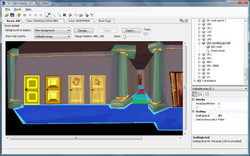Adventure Game Studio

The room editor in AGS v3.3.3
|
|
| Developer(s) | Chris Jones |
|---|---|
| Initial release | 1997 (version 1) |
| Stable release |
3.4.0.12 / September 15, 2016
|
| Preview release |
3.4.0.11 - RC2 / August 22, 2016
|
| Operating system | Windows, Mac OS X, Linux |
| Platform | Personal computer |
| Available in | English |
| Type | Game creation system |
| License | Artistic License version 2 (editor & runtime) |
| Website | Adventure Game Studio homepage |
Adventure Game Studio (acronym AGS) is an open source development tool that is primarily used to create graphic adventure games. It is aimed at intermediate-level game designers, and combines an Integrated development environment (IDE) for setting up most aspects of the game with a scripting language based on the C language to process the game logic.
The software is not related to the similarly-named, notable proprietary GameMaker: Studio platform released in 1999.
Adventure Game Studio was created by British programmer Chris Jones. AGS was originally released in 1997 as an MS-DOS program entitled "Adventure Creator".
Jones was inspired by the apparent simplicity of Sierra On-Line's adventure game interface, specifically as showcased in Space Quest IV: Roger Wilco and the Time Rippers. The first version of Adventure Creator allowed users to create only low-resolution, keyboard-controlled games.
Initially only small tests and demo games were created with AGS, and most of the more ambitious projects were cancelled. As a result of the lack of completed games and engine features, the user base was small, but the community grew slowly. Game developers started requesting more features so that they could create more complex games. Gradually, as these requests were implemented, AGS became a more capable toolkit and it was finally possible to create high-quality games with it.
After a long period of slow activity, Lassi Quest was released as the first complete AGS game in late 1999. It was not until Ben Croshaw's Rob Blanc and Philip Reed's Larry Vales games had been released in 2000-2001 that the engine gained widespread popularity. There is now an active community containing thousands of members, and a large output of completed games of all sizes.
AGS itself continues to be added to and improved upon, with the release of version 3.0 in January 2008 including a complete rewrite of the editor using the .NET Framework and an update to the game engine to support 3D hardware acceleration.
...
Wikipedia
